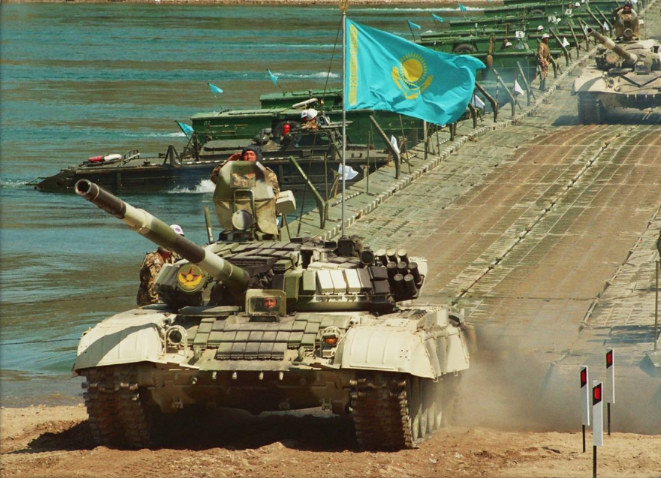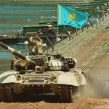
Kazakhstan Prepares for Peaceful NATO Transition in Post-2014 Afghanistan
Publication: Eurasia Daily Monitor Volume: 10 Issue: 174
By:

Kazakhstan is considering adopting measures to modernize its security structures, though somewhat surprisingly this has nothing to do with Astana’s assessment of a possible impact on Central Asian security stemming from the drawdown of the International Security Assistance Force (ISAF) from Afghanistan. The reasons for seeking to modernize the existing security system in the country therefore lie elsewhere, while differences between how the political-military elite views the post-2014 security environment compared with the country’s regional neighbors offer only limited scope for North Atlantic Treaty Organization (NATO) members to promote cooperative partnerships in Central Asia.
Beginning in 2014, NATO’s mission in Afghanistan will transition from combat operations to only supporting the host security forces. Astana’s lack of concern about any possible negative impact on Kazakhstan’s security resulting from this change was exemplified during a recent meeting of the government’s Security Council. On September 24, President Nursultan Nazarbayev led its session. Meetings of Kazakhstan’s Security Council are rarely reported and its work is mainly secret; however, the recent meeting concentrated on developing a national security strategy while taking account of “geopolitical challenges” and the need to “modernize” the national security system: no mention was made of Afghanistan. “The Kazakh president said that security challenges were not decreasing in the modern world. Among [the security challenges] are terrorism, social conflicts and economic instability, which are continuing. In this connection, the president noted the need to constantly monitor the situation in the World [sic] and take timely measures to correct and adapt the national security system to the changing situation,” a statement from the presidential press service noted (Interfax-Kazakhstan, September 24).
Kazakhstan’s official Military Doctrine, signed into law by President Nazarbayev in October 2011, downplays the potential threats to the state stemming either from the continuing conflict in Afghanistan or linked to NATO’s withdrawal in 2014. Security experts in Kazakhstan, and those with close government ties, are skeptical that ISAF’s transition to a supporting role in Afghanistan beyond 2014 will actually result in any diminished levels of state security for Kazakhstan, or in regional crises. Moreover, since the Barack Obama administration’s announcement in 2011 of the Afghanistan drawdown strategy, Kazakhstani military exercises show no major shift toward preparing for militant incursions or toward operations to liaise with security forces to counter an upsurge in narco-trafficking (Akorda, October 12, 2011).
An apparent departure from Astana’s line on Afghanistan occurred during a recent session of the Council of the Collective Security Treaty Organization (CSTO) in Sochi; though this may not indicate a change in the national threat perception. On September 23, Kazakhstan’s Prime Minister Serik Akhmetov addressed the CSTO session. Unusually for such a senior government official, Akhmetov expressed concern about the future security of post-2014 Central Asia; and his comments directly linked the departure of ISAF from Afghanistan to negative developments regionally. Akhmetov said, “The intensifying instability in Afghanistan and the Taliban’s stepped-up activities are making us think and seriously prepare for a possible negative development of the situation in Central Asia after 2014” (Interfax, September 23). Nevertheless, Akhmetov’s comments may have been geared toward Kazakhstan’s long-standing policy to facilitate the transformation of the CSTO into a regional security body capable of addressing real issues. In fact, the Kazakhstani prime minister tied his remarks specifically to the need for the CSTO to strengthen the border between Tajikistan and Afghanistan.
Akhmetov added, “Kazakhstan assesses the geopolitical situation, both in the [CSTO’s] area of responsibility and the World as a whole, over the recent period as quite complicated,” noting that domestic political tensions in the Middle East and North Africa carry potential risks for the region (Interfax, September 23). These comments, by no means alarmist, appear rooted in Astana’s policy within the CSTO—and do not seem to express much genuine concern about the post-2014 security environment. Akhmetov’s remarks also reflect a desire on the part of Kazakhstani policy makers to tie such collective security efforts to a multilateral framework, rather than see border security pursued only bilaterally—presumably between Moscow and Dushanbe. If there is any real concern in Astana that security in Central Asia may deteriorate due to the ISAF drawdown in Afghanistan, it is present only in so far as it relates to a wider anxiety over the unpredictable nature of events in the Middle East and North Africa. So while security policy in Astana by no means ignores Afghanistan, it is clearly neither mainly driven by these considerations, nor overly influenced by any single transnational issue, such as international terrorism or narco-trafficking.
Astana has developed a fledgling domestic defense industry. But in practical terms, this sector is mainly tied to joint ventures and in-country assembly. Hence, Kazakhstan’s priorities for modernizing its Armed Forces and non–defense ministry security structures bear little resemblance to Afghanistan-linked threat scenarios. Kazakhstan’s Defense Minister Adilbek Zhaksybekov paid an official visit to Turkey on September 25 and familiarized himself with his host country’s defense industry. Zhaksybekov met Muharrem Dortkashli, the director general of Turkish Aerospace Industries Inc. (TAI), and discussed bilateral defense cooperation in producing aviation equipment. “We are interested in TAI’s expertise,” the Kazakhstani defense minister noted. Zhaksybekov added that his government is looking into “the establishment of an aviation-technical center in Astana for manufacturing and servicing assets used in military-transport and combat aviation, which is a priority for the technical modernization of the Kazakh army” (Interfax, September 25).
Cooperation in this area is becoming “a constructive partnership on a mutually-beneficial basis,” Zhaksybekov asserted. TAI develops different types of aircraft, including attack helicopters and unmanned aerial vehicles (UAV), training aircraft and parts for Airbus—the latter is of interest to Astana after its recent high-profile procurement of Airbus assets. The longer term results of such joint ventures are unlikely to ready the country’s Armed Forces to repel hypothetical militant incursions. Reportedly, by the end of 2013, a Kazakhstani-Turkish joint venture, “Kazakhstan Aselsan Engineering,” will be launched in Astana to produce optical sights for firearms, night-vision equipment and thermal cameras (Interfax, September 25).
Nazarbayev’s instructions to the Security Council to work on further modernizing the national security system, though consistent with ongoing military upgrades and developing the capacity of the domestic defense industry, is not driven by Astana’s fears of the NATO drawdown from Afghanistan. The authorities, like the country’s leading strategists and security experts, remain cautiously vigilant about 2014 and its possible implications for the region. But most Western specialists tend to ignore that more pressing external potential sources of instability are much closer to Kazakhstan’s borders, especially stemming from any fresh revolution or inter-ethnic conflict in the Kyrgyz Republic.




